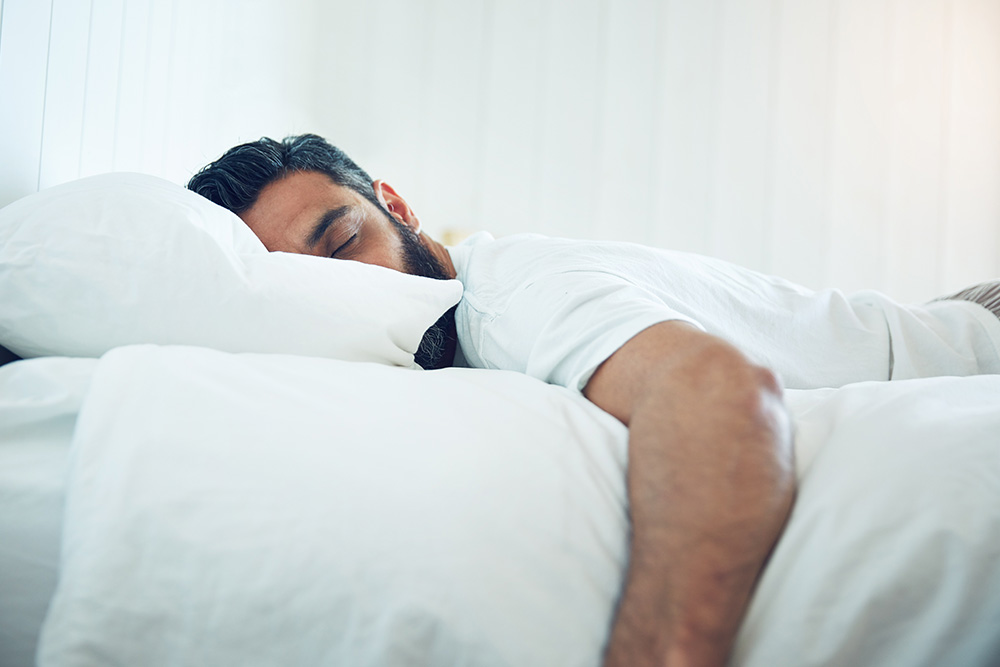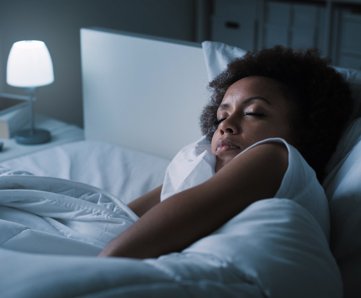How Intermittent Fasting Affects Sleep

Hunter Bennett
Intermittent fasting has fast become one of the most popular dietary trends of this century. Suggested to improve health and enhance fat loss, it has been adopted by people across the globe – and often with great success, I should add.
However, what is discussed less often is the impact that intermittent fasting can have on your sleep.
What is intermittent fasting?
Intermittent fasting pretty simply describes small periods of eating that are separated by much longer periods of not eating (which are known as fasting).
While simply abstaining from food may sound like a bit of an absurd dietary concept, you should try and remember that every single one of us fast while we sleep.
Throughout the duration of the night, we don’t eat a thing. We then proceed to break our fast with whatever we eat the next morning.
Get it – break fast – breakfast.
Although ‘intermittent fasting’ is often used to describe a broad range of eating patterns, it most commonly describes a mode of eating that simply has you extend your nightly fast by a few hours every single day.
This type of intermittent fasting can also be called time-restricted feeding.
How does intermittent fasting work?
I have already alluded to how intermittent fasting can be implemented, but I wanted to provide some more information on the topic.
You see, when you extend your overnight fast you see a significant decline in your body’s secretion of the hormone insulin. Additionally, you also see a serious rise in your secretion of human growth hormone (Ho, 1988; Heilbronn, 2005).
The benefits of intermittent fasting ultimately come from these key hormonal changes that occur when you spend time in a fasted state.
As a result, when you prolong your overnight fast so that it lasts between 14 and 18 hours, it will cause these desirable hormonal changes.
So the best way to implement intermittent fasting daily is to simply eat your first meal around 6 hours after waking every single day.
This will make sure that intermittent fasting work for you, no matter what time you wake up.
Simple and effective.
One thing to remember is that during your eating window, it isn’t like you can eat whatever you want. Intermittent fasting isn’t a magic bullet, but a way to improve your health and your eating habits.
So, your intent should be to eat regular healthy meals during your eating period – just like you would under normal circumstances.
Related Article: Intermittent Fasting For Weight Management & Health
What are the health benefits of intermittent fasting?
The main reason as to why intermittent fasting has become so popular is because it has been shown to have some pretty impressive benefits throughout the human body. These include:
- An improved ability to breakdown and metabolize fats for energy, therefore enhancing your capacity to lose fat (Blackman, 2002; Byrne, 2018).
- Improvements in insulin sensitivity, as well as chronic reductions in resting blood sugar levels (Arnason, 2017).
- Reductions in blood pressure (Moro, 2016).
- Marked improvement in blood cholesterol, typified by an increase in HDL cholesterol, and subsequent reduction in LDL cholesterol (Sutton, 2018).
- Reduced risk of cardiovascular disease and diabetes.
- Improve brain function, a reduced risk of experiencing age-related declines in cognition, and a reduced risk of developing dementia (Mattson, 2018).
Considering this, it probably deserves the hype it has received!
Does intermittent fasting affect sleep?
While the effect of intermittent fasting has been overwhelmingly positive, there have been some rather conflicting reports when it comes to the impact it can have on sleep.
You see, some people seem to suggest the implementation of intermittent fasting has improved their sleep quality out of sight, while others have said that it has made it near impossible for them to actually fall asleep at all.
Some people have even been asking if intermittent fasting causes insomnia!
So what gives?
The Research
First and foremost, there is some evidence to suggest that adopting an intermittent fasting schedule can have a positive effect on your circadian rhythm. In this manner, it can help regulate your daily hormone fluctuations to better optimize sleep (Longo, 2016).
Secondly, intermittent fasting has been shown to better regulate the balance between rapid eye movement (REM) sleep, and non-REM sl eep, which is an indication of global improvement in sleep quality.
eep, which is an indication of global improvement in sleep quality.
These improvements also occurred with fewer awakenings throughout the night’s duration. It further indicates a general increase in sleep (Qasrawi, 2017).
However, on the other hand, prolonged periods of fasting with a very limited caloric intake have been shown to cause a substantial rise in the hormone cortisol. This is of interest because cortisol can actually inhibit your ability to fall asleep, and reduce your sleep quality (Nakamura, 2016).
So really, like many of the reports, the research is a little bit conflicting – however, I do believe that it can be summarised with a simple explanation.
When implementing intermittent fasting with only a minor daily energy deficit, you will not see a large rise in cortisol, and sleep will actually improve. But, if you eat too little during your eating window, cortisol secretion will increase significantly, and sleep will suffer.
In the end (and in my opinion), it comes down to being able to balance your fasting window and your energy intake effectively – which can take some trial and error.
Do you need less sleep while intermittent fasting?
Considering the above information, some people have suggested that the reason some people may struggle to fall asleep during intermittent fasting is that it somewhat makes your body need less sleep.
Now, as I am sure you could have guessed, this isn’t the case at all.
While intermittent fasting may make some people more wakeful during the night, this is strict because of their heightened cortisol levels.
I can assure you that they still need 7-9 hours of sleep per night just like everybody else – which is why using the tips below while undertaking intermittent fasting is pretty darn important.
Related Article: Best White Noise Machines For Sleep
Best tips on how to sleep well during fasting
When it comes to maximizing your ability to sleep while undertaking intermittent fasting, there are a number of things that you can do. I should note that each of these can be used either in isolation or collectively to make up an extremely effective sleep routine – even if you are not fasting, for that matter.
Eat a carbohydrate-rich dinner
Many people choose to combine intermittent fasting with a low carb or ketogenic way of eating. While this may be an effective method of stimulating a little bit of extra fat loss, it does have some potential downsides.
You see, dietary carbohydrates have been shown to increase the production of serotonin, which is known to help you fall asleep.
With this in mind, by simply eating a carbohydrate-rich dinner 3-4 hours before bed, you will see a significant increase in your ability to fall asleep, and also experience a deeper more restful sleep in the process (Afaghi, 2007).
Limit screen time before bed
Electronic screens emit what is known as ‘blue light’ – a specific type of light that is also emitted by the sun.
This type of light stimulates receptors in the eye, which increases brain activity and alters hormone secretion to promote a state of wakefulness. In this manner, it ultimately tricks your body into thinking that it is daytime.
With this in mind, exposure to electronic screens before bed has been shown to significantly disrupt sleep quality and duration. This makes avoiding screens for an hour before bed a must for anyone looking to improve their sleep in a big way (Gringras, 2015).
Invest in a white noise machine
Last but not least, a great way to relax the mind is to listen to white noise while you fall asleep.
This type of noise essentially acts as a type of ‘anti-noise’ that distracts the brain from any unwanted thoughts, while also inducing a state of relaxation.
As you can imagine, this type of device has been shown to cause some large improvements in your ability to fall asleep, making it the ideal option (Stanchina, 2005).
Take Home Message
Intermittent fasting is a powerful dietary tool that can help promote fat loss, reduce inflammation, and cause a myriad of hormonal, cognitive, cardiovascular, and metabolic health benefits.
However, some individuals have noted that it can affect sleep quality under certain circumstances.
With this in mind, make sure that your intermittent fasting protocol is not causing you to consume too few calories. Consuming too few calories can drive up cortisol secretion. Try using some of the tips we have outlined in this article to boost sleep. You will thank us for later!
References
Heilbronn, Leonie K., et al. “Alternate-day fasting in nonobese subjects: effects on body weight, body composition, and energy metabolism.”. The American journal of clinical nutrition 81.1 (2005): 69-73.
Ho, Klan Y., et al. “Fasting enhances growth hormone secretion and amplifies the complex rhythms of growth hormone secretion in man.”. The Journal of clinical investigation 81.4 (1988): 968-975.
Blackman, Marc R., et al. “Growth hormone and sex steroid administration in healthy aged women and men: a randomized controlled trial.”. Jama 288.18 (2002): 2282-2292.
Byrne, Nuala M., et al. “Intermittent energy restriction improves weight loss efficiency in obese men: the MATADOR study.” International journal of obesity 42.2 (2018): 129.
Arnason, Terra G., Matthew W. Bowen, and Kerry D. Mansell. “Effects of intermittent fasting on health markers in those with type 2 diabetes: A pilot study.”. World journal of diabetes 8.4 (2017): 154.
Additional References
Sutton, Elizabeth F., et al. “Early time-restricted feeding improves insulin sensitivity, blood pressure. And oxidative stress even without weight loss in men with prediabetes.” Cell metabolism 27.6 (2018): 1212-1221.
Mattson, Mark P., et al. “Intermittent metabolic switching, neuroplasticity and brain health.” Nature Reviews Neuroscience 19.2 (2018): 63.
Longo, Valter D., and Satchidananda Panda. “Fasting, circadian rhythms, and time-restricted feeding in healthy lifespan.”. Cell metabolism 23.6 (2016): 1048-1059.
Qasrawi, Shaden O., Seithikurippu R. Pandi-Perumal, and Ahmed S. BaHammam. “The effect of intermittent fasting during Ramadan on sleep, sleepiness, cognitive function, and circadian rhythm.”. Sleep and Breathing 21.3 (2017): 577-586.
Nakamura, Yuko, Brian R. Walker, and Toshikazu Ikuta. “Systematic review and meta-analysis reveal acutely elevated plasma cortisol following fasting. But not less severe calorie restriction.” Stress 19.2 (2016): 151-157.
Afaghi, Ahmad, Helen O’connor, and Chin Moi Chow. “High-glycemic-index carbohydrate meals shorten sleep onset.” The American journal of clinical nutrition 85.2 (2007): 426-430.
Gringras, Paul, et al. “Bigger, brighter, bluer-better? Current light-emitting devices–adverse sleep properties and preventative strategies.” Frontiers in public health 3 (2015): 233.
Stanchina, Michael L., et al. “The influence of white noise on sleep in subjects exposed to ICU noise.” Sleep medicine 6.5 (2005): 423-428.
You Might Like:












